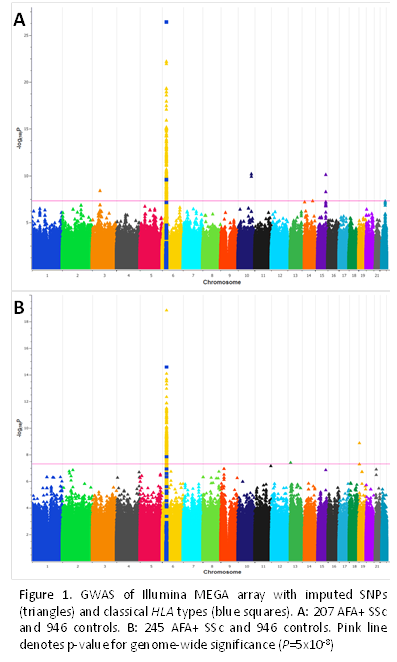Session Information
Date: Monday, October 22, 2018
Title: Systemic Sclerosis and Related Disorders – Basic Science Poster II
Session Type: ACR Poster Session B
Session Time: 9:00AM-11:00AM
Background/Purpose: Anti-fibrillarin (nucleolar, AFA) and anti-topoisomerase I (ATA) autoantibodies are specific to systemic sclerosis (SSc) and are common in African Americans (AA). These autoantibodies define clinically distinct phenotypes but the genetic risk factors contributing towards them are largely unknown.
Methods: Data from the genome-wide association study (GWAS) of AA SSc collected under the Genome Research in African American Scleroderma Patients (GRASP) cohort were utilized. 207 AFA and 245 ATA positive patients were compared to 946 controls. After quality control filtering, SNP imputation was performed using Beagle and classical HLA types were imputed using HLA*IMP:03 web server. Odds ratios for HLA alleles and amino acid residues were calculated using a dominant model.
Results: In the GRASP cohort, 22.2% of patients had nucleolar ANA pattern (AFA) after removing other nucleolar staining, SSc specific autoantibodies. In the AFA+ subset, HLA-DRB1*08:04 demonstrated the strongest association with P=4.2 x 10-27, OR=5.98 (95% CI 4.2-8.5) (Figure 1A). HLA-DRB1*08:04 is a predominantly African ancestry allele and its leucine 74 residue in the peptide binding groove was strongly associated with AFA+ SSc with OR=5.12 (95% CI 3.7-7.1). The top SNP in the HLA region was rs573310147 with P=1.3 x 10-19. ATA positivity was seen in 26.2% of patients in the GRASP cohort. In the ATA+ subset, rs28667353 was the top SNP with P=1.4 x 10-19 (Figure 1B). HLA-DPB1*13:01 was seen in 15.8% of ATA+ SSc as compared to 6.2% in ATA- SSc and 5.1% in controls. HLA-DPB1*13:01 demonstrated the strongest association with P=1.1 x 10-16, OR=4.1 (95% CI 2.9-5.8) in the ATA+ subset. HLA-DPB1*13:01 has been reported as a risk loci in ATA+ subset in SSc patients from several different ancestries. Meta-analysis with the European ancestry SSc yielded a highly significant P=2.18 x 10-61. On examining the amino acid residues, isoleucine 76 in the peptide binding groove of HLA-DPB1 increased risk for SSc with OR=2.8 (95% CI 2.1-3.8). Six other previously unreported, non-HLA loci were identified in the AFA + subset and two in the ATA + subset at genome-wide significance with the top one being FSD2 (Fibronectin type III and SPRY domain containing 2).
Conclusion: HLA-DRB1*08:04 is a predominantly African ancestry allele that increases SSc risk 6-fold in AFA subset which is primarily observed in AAs with SSc. This may help explain the increased prevalence and severity of SSc in AAs. HLA-DPB1*13:01 increases risk of SSc in not only AAs but all ancestral populations. Also, HLA-DPB1*13:01 control frequency in a population correlates with the prevalence of SSc in that ancestral population. Functional roles of these novel non-HLA loci need to be experimentally evaluated. Understanding the mechanism of peptide presentation by these two HLA alleles will lead to a better recognition of the trigger that leads to autoimmunity in SSc.
To cite this abstract in AMA style:
Gourh P, Remmers EF, Alexander T, Boyden S, Morgan ND, Shah AA, Mayes MD, Doumatey A, Bentley A, Shriner D, Domsic RT, Medsger TA Jr., Steen VD, Ramos PS, Silver R, Korman BD, Varga J, Schiopu E, Khanna D, Hsu V, Gordon JK, Saketkoo LA, Gladue H, Kron B, Criswell LA, Derk CT, Bridges SL Jr., Shanmugam V, Kolstad KD, Chung L, Jan R, Bernstein EJ, Goldberg A, Trojanowski M, Kafaja S, Maksimowicz-McKinnon K, Chandrasekharappa SC, Adeyemo A, Rotimi C, Wigley FM, Boin F, Kastner DL. Strong HLA and Novel Non-HLA Associations Identified By Auto-Antibody Subset Analysis of African Americans with Scleroderma from the Genome Research in African American Scleroderma Patients Cohort [abstract]. Arthritis Rheumatol. 2018; 70 (suppl 9). https://acrabstracts.org/abstract/strong-hla-and-novel-non-hla-associations-identified-by-auto-antibody-subset-analysis-of-african-americans-with-scleroderma-from-the-genome-research-in-african-american-scleroderma-patients-cohort/. Accessed .« Back to 2018 ACR/ARHP Annual Meeting
ACR Meeting Abstracts - https://acrabstracts.org/abstract/strong-hla-and-novel-non-hla-associations-identified-by-auto-antibody-subset-analysis-of-african-americans-with-scleroderma-from-the-genome-research-in-african-american-scleroderma-patients-cohort/

